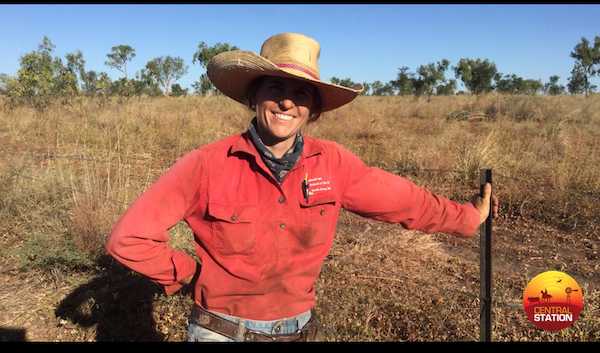The CDU catch up
Host: Charles Darwin University, Katherine Rural Campus
Written by Alison Haines – VET Lecturer, Charles Darwin University.
Hello Again from Alison and Fiona! You may remember us from our blog last year describing the work that we do for the Charles Darwin University’s Agriculture and Rural Operations team as VET Lecturers / Workplace Assessors (Horse/Cattle Production, based out of Katherine Rural Campus).
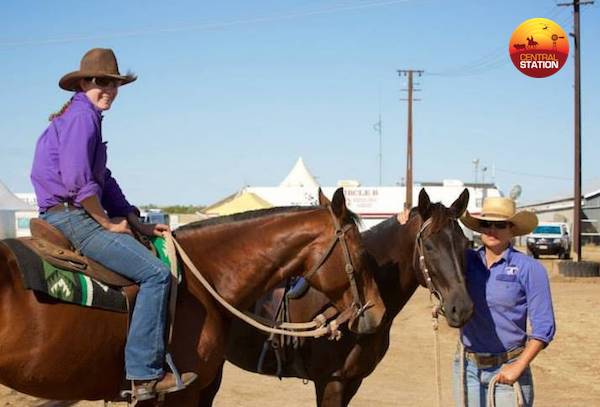 Fiona Plunkett and Alison Haines at Brunette Downs Race weekend.
Fiona Plunkett and Alison Haines at Brunette Downs Race weekend.
As I write this, we are currently sitting on a plane from Sydney to Tasmania, where we are going to present at the 26th National Vocational Education and Training Research Conference. We will be talking about how we provide training and assessment services to some of the most remote areas in the Northern Territory, the challenges this brings and the solutions we have come up with. While waiting to board the plane and idly scrolling through Facebook (as you do) I spotted an article about how south east Australia is having the coldest week on record for 110 years!! (*shudder*) So now we are just praying we have packed enough coats!
Many other exciting things have been happening since our last blogs. In December I took over as Training Team Leader until the end of 2017 and Fiona, as well as taking over my role as Workplace Trainee Coordinator and mentoring the 2 new staff, has been named as a finalist in the NT Training Awards VET Trainer of the Year Award (we will find out who won in September). We have got some new VET Senior School programs running at the campus and in Darwin which we will share with you throughout the week. Last but definitely not least, we are introducing two new team members who are working with the on-station workplace trainees. You will meet them in blog 2 . . .
First off though, we’d like to follow on from last year’s fist blog “Life on the road with Alison and Fiona” and to elaborate on WHY we do what we do. Sure, it’s a GREAT job and we love it, but WHY on earth would anyone want to study while working in a stock camp?! Additionally, from a bigger picture perspective how does what do we do as trainers give back or contribute to the industry?
So these are our thoughts why workplace assessment works:
In the Northern Territory pastoral industry, indeed in the Australian agricultural industries generally, in recent years there has been a greatly increased focus on improved management of and outcomes in animal welfare, Work Health and Safety, environmental sustainability, productivity and profitability. This has led to a greater focus on staff training, upskilling, and retention.
This means that lately, there has been more recognition in the cattle industry of the value of both practical workplace experience and formal qualifications. The advantage of formal qualifications is that they ensure underpinning knowledge requirements are met and provide a framework for ensuring employees learn what they need to know, as well as understanding industry requirements and processes. This enables employees to be safe and to succeed in the workplace and therefore enhances business productivity and profitability.
Our objectives are to develop the skills and knowledge of agriculture workers from initial entry level through to junior management, “from the ground” up if you will. We aim to deliver real, tangible, useful and appropriate knowledge and skills to benefit employees, employers, and businesses. This improves overall industry and workplace outcomes and helps to benchmark and disseminate best practice standards across the industry as a whole.
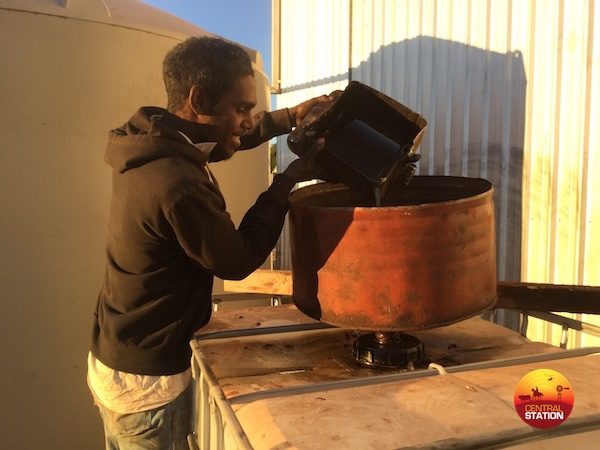
The training allows participants gain practical skills as well as the knowledge to clearly understand why they do what they do. To understand the greater purpose and guiding principles behind the day to day tasks and guidelines they have to follow. It increases their engagement in their workplace and as a whole highlights the myriad of career paths available in agriculture and related industries.
In developing our training programs, we have focussed on increased communication and collaboration with all parties as well as frequent review and validation of training resources and assessment materials to reflect updates required by the latest legislative changes. We also researched the latest industry performance benchmarks set out in the various industry employment agreements and the position classifications within the Pastoral Award.
Our extensive industry consultation and engagement allows Charles Darwin University to have confidence that we are delivering products and services that are at the forefront of our industry and that benefit students and employers.
Our training programs give people beginning work in the industry a solid foundation in what they need to know and the skills they need to have to succeed. For those with more experience, undertaking completion of a workplace based qualification highlights pathways to further career opportunities, engages people in the industry, and therefore supports long term staff retention.
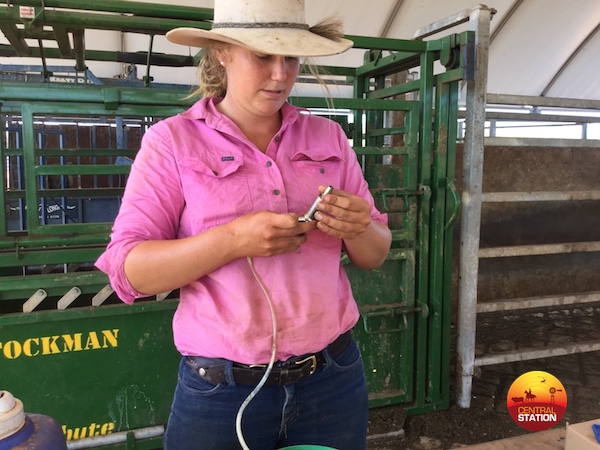
So – how do we ensure that trainees gain the required skills and knowledge?
A brief outline of our assessment methods are as follows:
For workplace students, our rigorous three part assessment process ensures students meet industry requirements. Firstly the theory component requires the student to know the hows and whys of the agricultural industry. Secondly we have an assessor observation checklist which encompasses a specific list of skills for each unit. Lastly the student’s supervisor must also go through the same observation checklist as the assessor and be completely satisfied that the student can perform all these necessary elements of the checklists.
The assessments, study guides and resource materials were developed in close conjunction and consultation with employers. Feedback was gathered from employers and trainees to make annual improvements on resources and assessment materials. Industry publications were accessed and are provided to the students as study resources as well as being referenced in assessment questions to ensure learning is up-to-date, relevant and industry/enterprise specific.
Level 2 and 3 assessments are contextualised so that the knowledge questions can be conducted verbally, where appropriate, to allow for students with Language Literacy and Numeracy challenges. The training plans for these students allow increased time for learning to take place in the workplace and additional tutoring to be provided in essential knowledge areas.
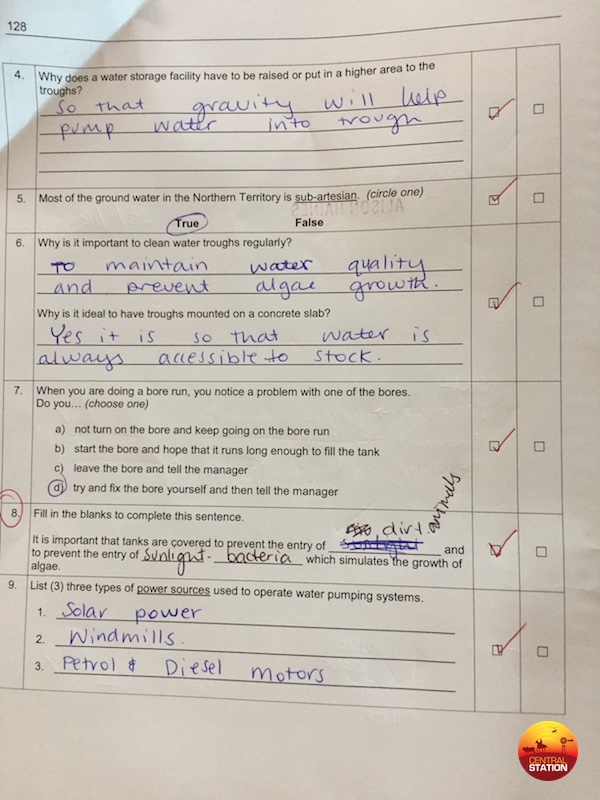
We find that the combined observation assessment and supervisor report checklist for each unit enhances the collaboration between ourselves as the assessor and the supervisor/employer. By formalising the process it ensures time is made to review student progress and ensures all elements of competency are covered. It gives us a chance to discuss workplace performance and identify areas where the student needs more practice or workplace experience, or if these are skills areas where the student will benefit most from specific gap training, for example a horsemanship school or basic machinery maintenance short course.
Given the remote nature of the workplaces and students involved, training and assessment takes place on-the-job, with assessors spending extended time in the workplace with the trainees, working alongside them in cattle yards, on horses mustering cattle or carrying out general maintenance tasks such as fencing. When we go out to the stations it is vitally important that we are able to be involved in whatever station tasks are happening at the time. This opens the door for us to perform workplace observations without making the students feel like they are being closely scrutinised. It also gives us a chance to ask students why they perform tasks in a certain fashion or why (for example) they vaccinate their cattle and for which diseases. Questions like these, asked during the work day, tie in with the required theory assessments. From these observations and questioning practices we are able to get a holistic picture of the students’ current knowledge and practical abilities.
We work hard to build a rapport with the students and their supervisors. This rapport improves communication and breaks down the student/teacher barrier. This allows the student to be happier to talk to us about their progress on station, their qualification and about skills they want to improve on. It allows the students to be comfortable to ask us for help or practical advice which in turn opens the door for students to have more control over their own learning and ultimately success.
During these visits, the feedback on course content and assessment materials is gathered. This feedback is then included in the next year’s update of resources and assessments. Often it is as simple as changing the wording of a question that we THOUGHT made sense. Only to find out that in practice, students were struggling to understand exactly what the question was asking. We find that this increases student engagement and success.
The better peoples workplace skills are, the easier their jobs and the shorter (and safer) their days. We strongly believe that quality training, the promotion of industry best practice and the expansion of knowledge will help to lift and ensure standards in these and related areas across the northern pastoral and agricultural industries.
We aim to conduct five visits to each station and each student throughout the year. These visits are a minimum of twenty four hours each and can take up to three days, dependant on the number of students at each property. This allows time to spend with the student in the workplace, to conduct practical observations, to mark theory assessments, to assist with questions and to discuss the student’s progress with their supervisor.
Working alongside our students and their employers also allows us to help students improve their practical skills. Little bits of advice or demonstrations on best practice ways of performing tasks has often led students to quip “Hmm that makes my job a bit easier.”
We work with employers to facilitate specific skills training, conducted both by us and by outside organisations. We conduct face to face sessions as requested, usually at the start of the year, covering a range of topics that will assist students and station staff with their jobs. We liaise with the Training Team Leader who organises other trainers in our team to travel remotely and deliver face to face short courses on-station for a variety of areas such as four wheel drives, chainsaws, welding, and chemicals. We recognise and include as partial evidence of competency, non-accredited skills training courses organised by the employers and attended by the students. The most common of these are horsemanship and basic horse shoeing.
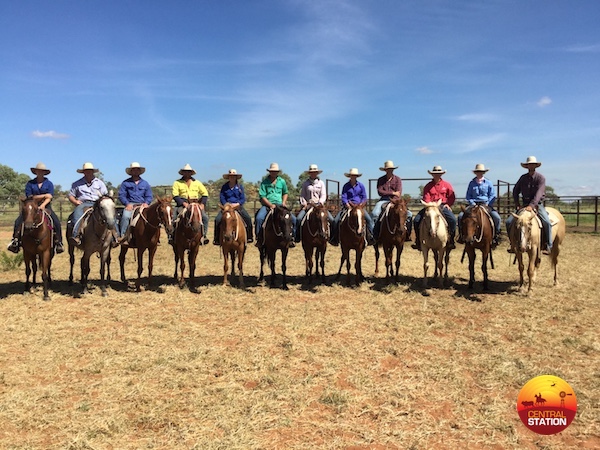
We continue to work closely with station employers, to improve our courses and make sure that we are setting the bar at the same level. We closely monitor student progression throughout the year. We, along with the employers, get a great sense of satisfaction in seeing the change in the skills, confidence and ability of our students and their growth as people. For some of these students, we have seen them start out as uncertain and apprehensive first year employees and grow into confident people who now call the territory home and are successfully running station camps or in some cases managing stations. For others who may only stay a year it’s an experience they will never forget whilst they gain skills that will last them a lifetime and in that one short year, the way they change and grow in skills, confidence and self-assurance is extraordinary.
